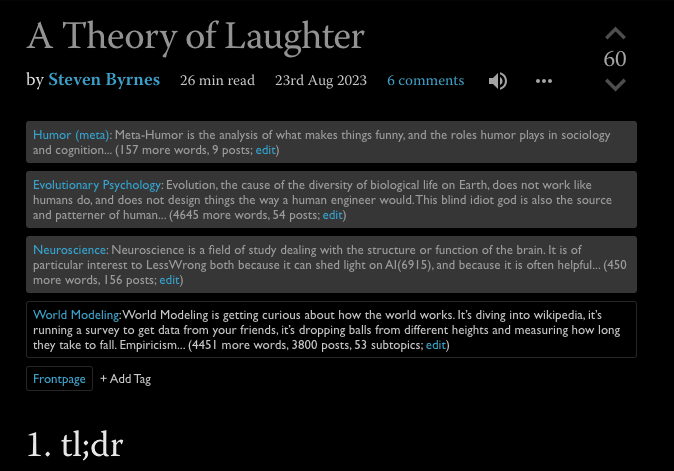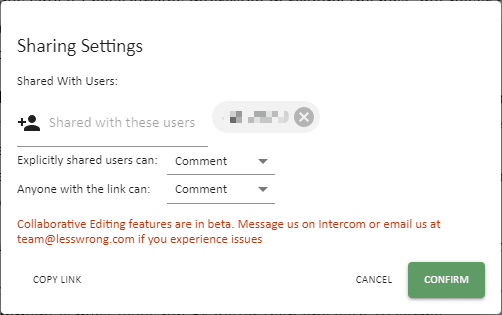6 Answers sorted by
147
- prominent placement. eg:
- use of tags on a post embeded as their intro into the post even without hover, perhaps at the bottom of the post, perhaps at the top. Users don't seem to consistently realize that the wiki tags are lists of relevant topics.
- recently edited wiki pages in the sidebar.
- or at least just put the wiki in the sidebar at all, or clarify what it is, right now it's just under "concepts" and clicking that gives you a big, hard-to-read list. You can hover each one to get the beginning of the summary, but to do that you need to have already been motivated to do so, and it's a trivial inconvenience.
- use of tags on a post embeded as their intro into the post even without hover, perhaps at the bottom of the post, perhaps at the top. Users don't seem to consistently realize that the wiki tags are lists of relevant topics.
- suggestion in the lesswrong editor to make phrases that match as titles of wiki pages into links to those wiki pages
- or just find all places a wiki page is mentioned as a link from the wiki page; this is already possible with the current upgraded search engine, just would be more convenient to have a button for it
- extra bonus points for showing the search results on the wiki page itself in a way that doesn't take too much attention but which makes it a clear feature. eg, put a search for untagged posts and comments below the list of tagged posts.
- or just find all places a wiki page is mentioned as a link from the wiki page; this is already possible with the current upgraded search engine, just would be more convenient to have a button for it
- make sure wiki page edits show up in recent discussion. I vaguely remember they might already, but also remember finding them slightly confusing. might be false memory either way.
- related pages via semantic search? longstanding wishlist item. search recently improved, possibly already solved.
- in particular, suggested or similar tags views on every post.
- this could be done by embedding every post (or every paragraph in every post) using the openai api (or another embedding model from MTEB) and using a semantic-search-with-BM25 similarity comparison to find relevant wiki topics. Bonus points for two way linking.
- view on wikipedia, ask gpt, etc buttons, to accelerate importing existing overviews?
- LLM programs to detect out of date wiki pages, eg given page=<wiki page content>, post=<post tagged with that wiki tag>, run gpt4
[{"role": "system", "content": f"Here is a wiki page. Bot please review whether user's article has anything new to add on top of the following wiki page.\n\n> {page}\n\nBot write a VERY CONCISE, ONE SENTENCE, NO NEWLINE overview of what topics the user's article adds beyond the above wiki page."}, {"role": "assistant", "content": "Min word use active."}, {"user": post}]and then use this to generate summaries of what each post with a tag has to add to a topic it's tagged with. I'd guesstimate without even fermi estimating it that this would cost $5k to run all lesswrong posts with gpt4. Note that the brevity prompt is for human use, not to save AI tokens.
I agree. I was also about to post a reply along these lines. The key point is visibility. It already helps that the search lists wiki pages first, but I'd like
- linking to related wiki pages at the top as sketched by gears to ascensio above
- maybe unifying wiki pages and tags, making it easier to link to wiki pages
- allowing discussions on wiki pages
- showing recent edits or comments to wiki pages in the /allPosts page
Out of distribution ideas:
- more karma for wiki pages and wiki page edits or linking to wiki pages
- linking from corresponding pages on Wikipedia
131
Beginning with the name, "Tags", I don't see this system as a wiki. I see it as a tags system whose main purpose is to surface related articles; and occasionally a tag has an explanation attached. Unfortunately, article surfacing doesn't work well because a) articles are tagged inconsistently[1]; and b) articles are sorted by how highly their tag is upvoted, which I find unintuitive behavior with unintuitive sorting results.
Anyway, if I look at the Tags system for a minute as if it was Wikipedia, here's what I see:
- On Wikipedia, one wiki page leads to either other wiki pages or external links. In the LW Tags pages, there's a weird separation between linking to other tags pages vs. linking to LW posts vs. the list of tagged LW posts at the bottom. Because of this, there's no LW equivalent to wiki rabbit hole browsing.
- Any tag which exceeds one page's worth of text (like this one) hides that text behind a "Read more" button. That's not the behavior you'd expect to see if the Tags explanations were meant to be read.
- LW has a strong authorship focus; for any normal post I know exactly who is responsible for what part of the text: namely, the author is responsible for everything. Whereas in the Tags system, I just noticed that the Tags pages do indicate who is responsible for which edits, but I still don't have nearly the same trust in the authoritativeness or cohesiveness of the overall content as I would for a normal post.
- Also, normal LW posts have comments at the bottom; tags pages have a discussion section you have to click into, which I expect few people to do.
- From what I can tell, there's no curation of tags pages, to indicate whether a tags page is accurate and/or worth reading. The rest of LW promotes posts if they have high karma, but a voting system seems ill-suited for content which is regularly edited. Imagine if curated tags pages appeared in the LW Recommended section or in the main feed.
- Anyway, LW contains way way way too much text for anyone to read everything, so I consider the lack of discoverability and promotion of good tags reason enough that I basically never bother with them.
- Due to lack of discoverability of Tags pages, I'd have to seek tags out intentionally, but the big Tags page is intimidating and doesn't encourage exploration and rabbit hole browsing in the way the Wikipedia homepage does.
All this taken together means that, if I want to know what a concept like "Calibration" is, my first impulse is not to check the tags page, but to look for high-karma LW posts which answer this question. So I hardly ever read the contents of Tags pages.
- ^
Tagging of new and existing LW posts is an obvious candidate to benefit from AI assistance; I vaguely recall seeing someone already looking into that.
Addendum: Apparently parts of the old LW1.0 wiki were imported as untaggable "wiki" pages (basically just tags with an internal checkbox which prevents them from being associated with any posts). Example page.
These pages are not visible on the Concepts (All Tags) page, either, except for one link at the top which mentions this import process. The wiki pages can be found via the search, though. I'm not sure whether they can be reached or found anywhere, otherwise.
So that's one more point in favor of Tags being implemented almost entirely as a tags system, a...
5-1
The main blocker for me is social rather than technical. Back when the new wiki first started, I created a page but the LW devs (or at least one of them) didn't like the page. There was some back and forth, but I came away from the discussion feeling pretty unwelcome and worried that if I were to make more contributions they would also involve lengthy debates or my work would be removed. I haven't really kept up on the wiki since that time, but I haven't seen anything that has changed my mind about this.
A few technical things that would make it nicer to edit:
- Wikilinks (perhaps things have changed now, but it was not possible to surround words in double square brackets like on many wiki software)
- Automatic backlinks
30
Standard software-development question: what use cases and activities are you seeing now, and what do you want? Are they different in kind, or just quantity?
For me, it's not features (as far as I know) that are lacking, it's missing a well-defined purpose that it serves. Why does LW have a wiki, and what should be there, rather than in other, more authoritative locations?
When I reference LW contents, it's almost always posts I find and use, though sometimes a wiki page summarizes a sequence or topic better than any one post does, and I really appreciate when that's the case. I kind of wonder, though, if topics important enough to curate a page for shouldn't go on Wikipedia rather than LessWrong.
My use case is either good and short summaries with some useful links, or as a tag (to share the list of tagged posts), or both.
Also another reason I might prefer the LW wiki explanation to somewhere else's explanation is to have the LW style and lingo (which Wikipedia for example wouldn't have).
I think I would like a page for "the LessWrong consensus on parenting, AI forecasting, janas" I don't think wikipedia would take what I consider to be good sources on those topics.
32
Quickly revert other people's edits.
It's common on wikis to be able to quickly revert an entire edit from another editor. This adds cost to making monolithic edits (which can be reverted in much less time).
10
When I am writing my articles, I prefer a workflow in which I am able to show my article to selected others for discussion and review before I publish. This seems to not be possible currently without giving them co-authorship - which often is not what I want.
This could be solved for example by having one additional option that makes the article link accessible by others even while it is in draft mode.
Unless you are specifically talking about writing a wiki article (which I have 0 experience), it is possible to do this with a draft without co-authorship.
I sense this is possible, though what I want is for articles to just be public but not posted to the front page.
Here are my suggestions of Pull Requests I might make. I'd appreciate comments on them. https://docs.google.com/document/d/1EAk8656h4P7OBmYVvxkwCryiCp250MEH7SMuFGVFBGM/edit?usp=sharing
I suspect that ~nobody will see these if you post them in a comment or Google Docs link. Instead consider writing a short follow-up LW post which contains the suggested pull requests in the text while also linking to the Google Doc and this Q&A.
I don’t have an answer to this, but my impression is that the LW 1.0 Wiki was edited a lot more than the LW 2.0 Wiki. This seems like a thread worth investigating.


The LessWrong wiki does not seem as well used as it should be. I guess this is a lack of editors.
@Vladimir_Nesov made a good point that many standard wiki-editing features are missing which makes the prospect unappealing.
So in the spirit of this, what features would cause you personally to edit a lot more than you currently do?
I may try and pay some devs to write the pull requests if they seem feasible.